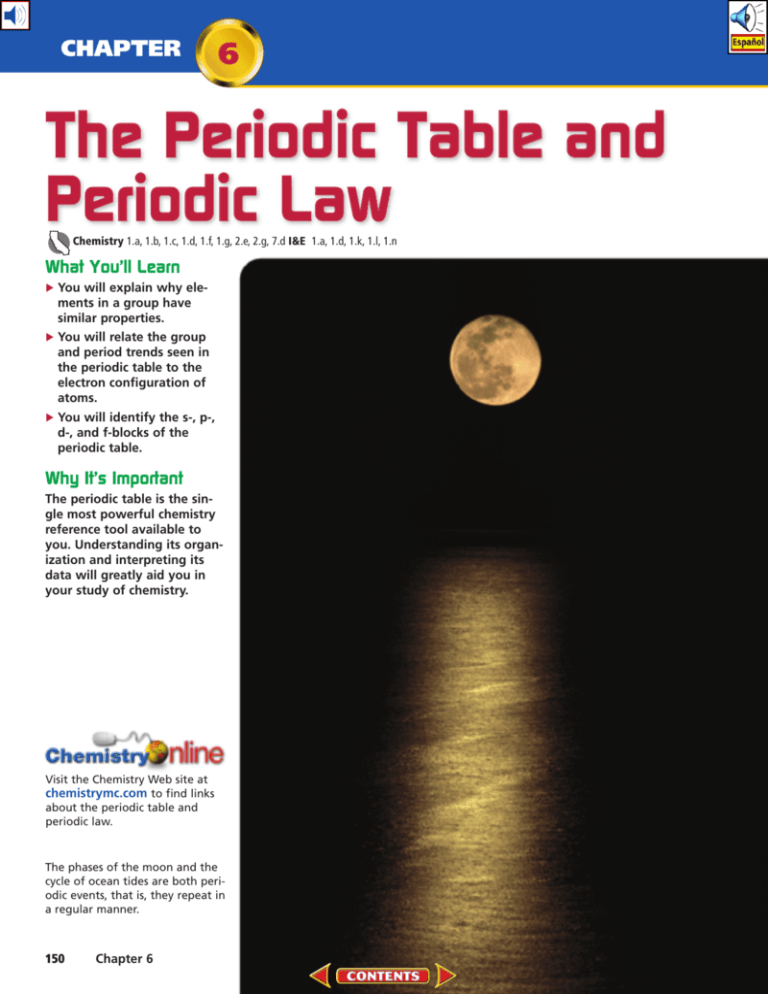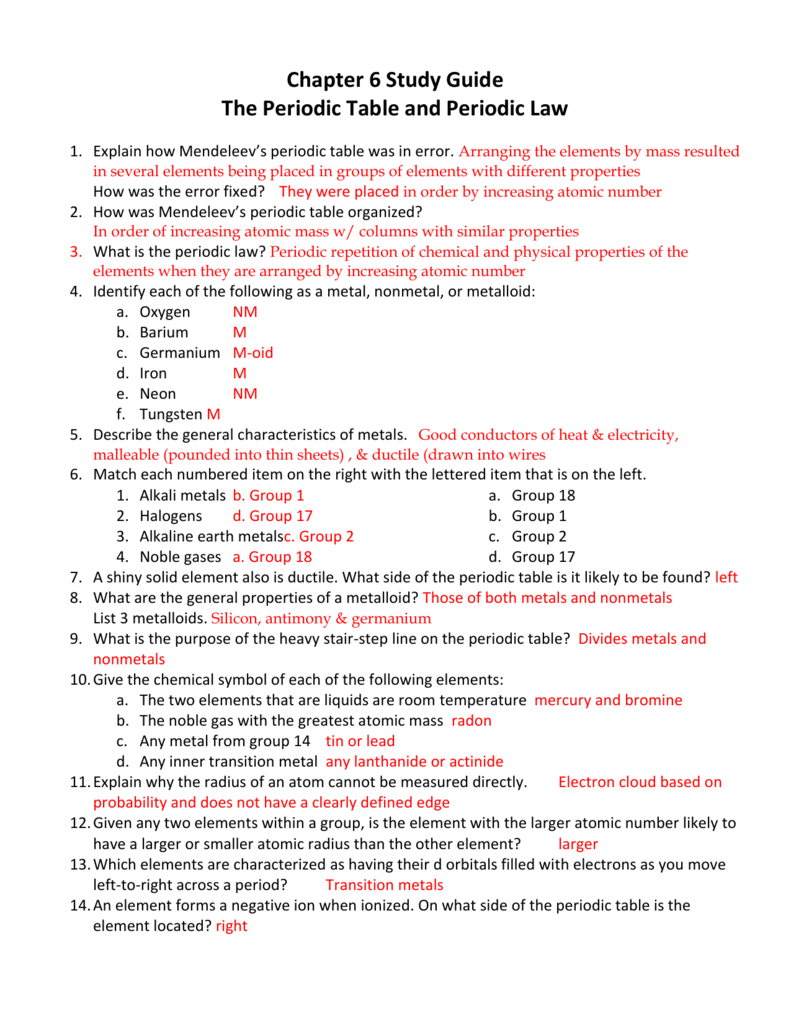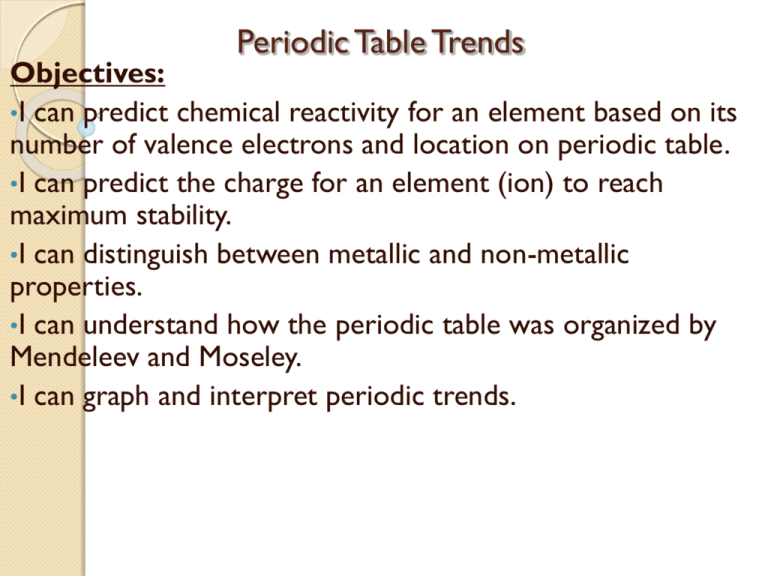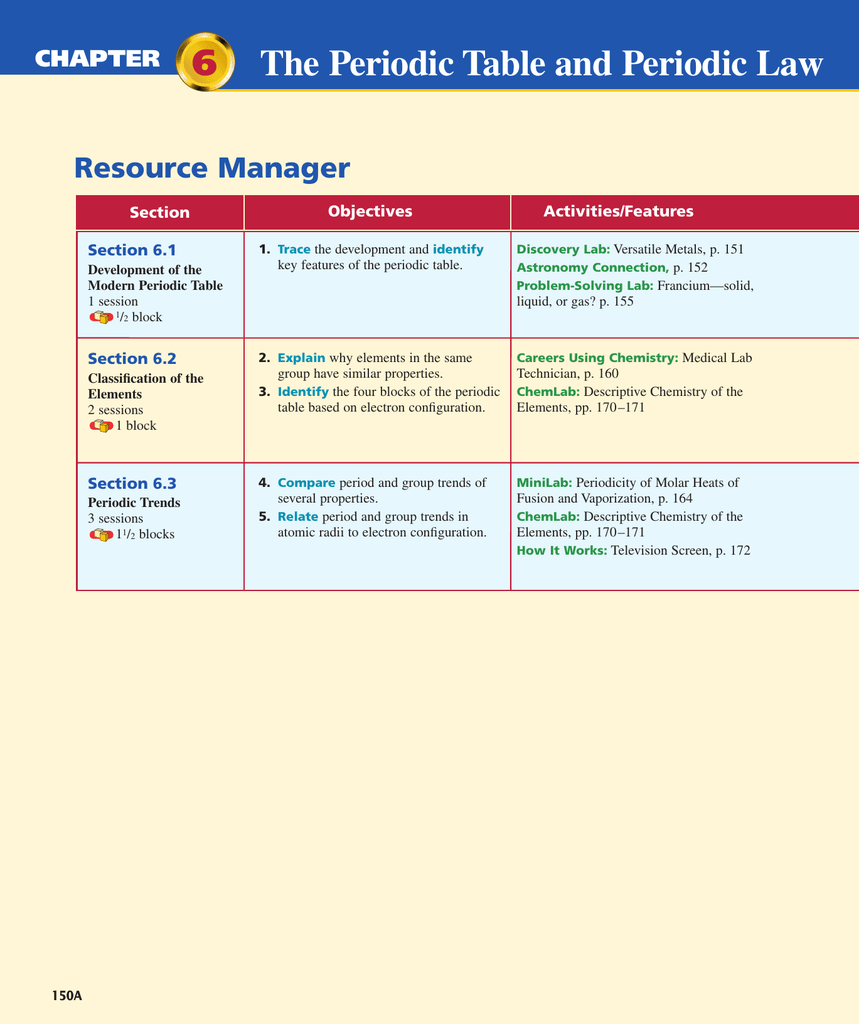Chapter 6 The Periodic Table And Periodic Law
Chapter 6 The Periodic Table And Periodic Law - Include contributions made by lavoisier, newlands, mendeleev, and moseley. That when elements are arranged according to increasing atomic number there is a periodic repetition of their chemical and physical properties. What did newlands discovered (1865)? Group 1 a elements, except for hydrogen, that are on the left side of the modern periodic. He discovered that the properties of elements repeat in a periodic way. Web 1/16 previous ← next → flip space created by ambssbabyy123 chemistry test review terms in this set (16) periodic law statement that when the elements are arranged by increasing atomic number, there is a periodic repetition of their chemical and physical properties. Identify different key features of the periodic table. Group a vertical column of elements in the periodic table arranged in order of increasing atomic number;. Learn vocabulary, terms, and more with flashcards, games, and other study tools. Explain why elements in a group have similar properties.
Web increasing atomic number is called the periodic law. That when elements are arranged according to increasing atomic number there is a periodic repetition of their chemical and physical properties. Reading check compare and contrast the ways in which mendeleev and moseley organized the elements. Relate the group and period trends seen in. A column on the periodic table. Web chapter 6 the periodic table and periodic law section 6.1 development of the pt 1. Representative elements group a elements transition elements group b elements Group a vertical column of elements in the periodic table arranged in order of increasing atomic number;. Web periodic law (6.1) statement that there is a periodic repetition of chemical and physical properties of the elements when arranged by increasing atomic number. Properties of groups and periods in the late 1800s, russian chemist dmitri mendeleev created the periodic table by organizing elements by their atomic weight in increasing.
Representative elements group a elements transition elements group b elements Properties of groups and periods in the late 1800s, russian chemist dmitri mendeleev created the periodic table by organizing elements by their atomic weight in increasing. Lilia pronin numerade educator 01:12 problem 2 sketch a simplified. Explain why elements in a group have similar properties. Web video answers for all textbook questions of chapter 6, the periodic table and periodic law, glencoe chemistry by numerade Web chapter 6 the periodic table and periodic law vocabulary. The arrangement of the periodic table is based on the number of: Web periodic law (6.1) statement that there is a periodic repetition of chemical and physical properties of the elements when arranged by increasing atomic number. A column on the periodic table. The periodic table and periodic law.
Chapter 6 The Periodic Table And Periodic Law Study Guide Study Poster
Web increasing atomic number is called the periodic law. Protons in the nucleus of an atom of the element. That when elements are arranged according to increasing atomic number there is a periodic repetition of their chemical and physical properties. The arrangement of the periodic table is based on the number of: Web the number of protons in the nucleus.
Chemistry Chapter 6 The Periodic Table Worksheet Answers
Protons in the nucleus of an atom of the element. Web start studying chapter 6: Group 1 a elements, except for hydrogen, that are on the left side of the modern periodic. Web increasing atomic number is called the periodic law. The periodic table and periodic law.
Chapter 6 the periodic table
The periodic table and periodic law. Representative elements group a elements transition elements group b elements Web chapter 6 the periodic table and periodic law vocabulary. Group a vertical column of elements in the periodic table arranged in order of increasing atomic number;. The law that states that the repeating chemical and physical properties of elements change periodically with the.
Chapter 6 The Periodic Table and Periodic Law
Group 1 a elements, except for hydrogen, that are on the left side of the modern periodic. Include contributions made by lavoisier, newlands, mendeleev, and moseley. Web video answers for all textbook questions of chapter 6, the periodic table and periodic law, glencoe chemistry by numerade Click the card to flip 👆. Web problem 1 describe the development of the.
Chapter 6 The Periodic Table and Periodic Law
Click the card to flip 👆. The periodic table and periodic law in this chapter: Table 6.2 summarizes the contributions of. The arrangement of the periodic table is based on the number of: Web periodic law (6.1) statement that there is a periodic repetition of chemical and physical properties of the elements when arranged by increasing atomic number.
Chapter 6 Study Guide The Periodic Table And Periodic Law Study Poster
He discovered that the properties of elements repeat in a periodic way. Group a vertical column of elements in the periodic table arranged in order of increasing atomic number;. The law that states that the repeating chemical and physical properties of elements change periodically with the atomic numbers of the elements. Web start studying chapter 6: A column on the.
Chapter 6 The Periodic Table and Periodic Law
Click the card to flip 👆. The periodic table and periodic law. The law that states that the repeating chemical and physical properties of elements change periodically with the atomic numbers of the elements. Web tjdubinski terms in this set (26) periodic law states that when the elements are arranged by increasing atomic number, there is a periodic repetition of.
Chapter 6 Periodic table
Group a vertical column of elements in the periodic table arranged in order of increasing atomic number;. Reading check compare and contrast the ways in which mendeleev and moseley organized the elements. The periodic table and periodic law in this chapter: Web the number of protons in the nucleus of an atom. Web 1/16 previous ← next → flip space.
Chapter 6 Periodic Table CeilidhMavi
Learn vocabulary, terms, and more with flashcards, games, and other study tools. Table 6.2 summarizes the contributions of. He discovered that the properties of elements repeat in a periodic way. Include contributions made by lavoisier, newlands, mendeleev, and moseley. Web 1/16 previous ← next → flip space created by ambssbabyy123 chemistry test review terms in this set (16) periodic law.
Chemistry Chapter 6 The Periodic Table Worksheet Answers
He discovered that the properties of elements repeat in a periodic way. Table 6.2 summarizes the contributions of. Protons in the nucleus of an atom of the element. Web tjdubinski terms in this set (26) periodic law states that when the elements are arranged by increasing atomic number, there is a periodic repetition of their properties. What did newlands discovered.
Web Chapter 6 The Periodic Table And Periodic Law Section 6.1 Development Of The Pt 1.
Reading check compare and contrast the ways in which mendeleev and moseley organized the elements. The arrangement of the periodic table is based on the number of: Identify different key features of the periodic table. Lilia pronin numerade educator 01:12 problem 2 sketch a simplified.
The Periodic Table And Periodic Law.
Group a vertical column of elements in the periodic table arranged in order of increasing atomic number;. Web tjdubinski terms in this set (26) periodic law states that when the elements are arranged by increasing atomic number, there is a periodic repetition of their properties. That when elements are arranged according to increasing atomic number there is a periodic repetition of their chemical and physical properties. Web the number of protons in the nucleus of an atom.
Web Increasing Atomic Number Is Called The Periodic Law.
Table 6.2 summarizes the contributions of. Web 1/16 previous ← next → flip space created by ambssbabyy123 chemistry test review terms in this set (16) periodic law statement that when the elements are arranged by increasing atomic number, there is a periodic repetition of their chemical and physical properties. Properties of groups and periods in the late 1800s, russian chemist dmitri mendeleev created the periodic table by organizing elements by their atomic weight in increasing. Group 1 a elements, except for hydrogen, that are on the left side of the modern periodic.
When The Elements Are Arranged In Order Of Increasing Atomic Number, There Is A Periodic Pattern In Their Physical And Chemical Properties.
Learn vocabulary, terms, and more with flashcards, games, and other study tools. He discovered that the properties of elements repeat in a periodic way. Click the card to flip 👆. Web video answers for all textbook questions of chapter 6, the periodic table and periodic law, glencoe chemistry by numerade







